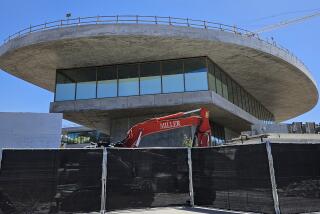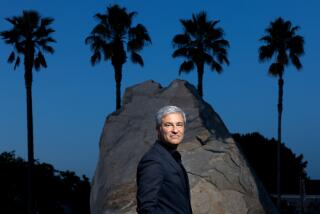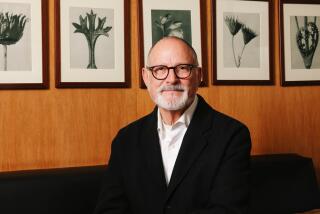Priorities Questioned in Face of Rioâs Ritzy Museum Plan
RIO DE JANEIRO â This status-conscious city boasts designer shops from Italy, a designer hotel being built by Philippe Starck, and designer bodies on the beach, courtesy of Brazilâs love of plastic surgery.
Now Rioâs mayor desperately wants a designer museum, and heâs prepared to pay a bundle.
After his election last month to a second four-year term, practically the first thing Mayor Cesar Maia did was dispatch an aide to New York to revive plans to snag the biggest brand name of them all on the international museum circuit: Guggenheim.
Never mind that a local court threw out a deal that Maia inked with the Solomon R. Guggenheim Foundation last year to establish an outpost here, or that a groundswell of opposition trashed his proposal as a piece of hubris and folly worthy of Maiaâs Roman namesake. And forget a price tag that could easily exceed $200 million in a city where thousands are too poor to afford running water or electricity.
Maia, a leader known for his ambition and what some call high-handed ways, is determined to see through his plan to build a French-designed arts complex half-submerged in Rioâs dirty Guanabara Bay. Anchored by a Guggenheim branch featuring classical and contemporary Brazilian works, the complex would revitalize a derelict downtown dock area and attract tourists and cruise ships from the world over, Maia contends.
âIf I didnât believe Iâd succeed in constructing the museum, I wouldnât take up the matter again,â he told the Jornal do Brasil newspaper shortly after his reelection.
But determination also persists among those intent on blocking the project, a coalition of politicians, artists, architects and residents who believe the mayorâs priorities are more than a little misplaced in a city saddled with a stratospheric homicide rate, high unemployment and failing schools.
So far, opponents have the law on their side. The court ruling said that Maia had no right to sign a deal committing the city financially for an entire decade and that his agreement with the Guggenheim Foundation was improperly based on U.S., not Brazilian, laws.
âThe project not only has a very high price, but itâs also full of irregularities and illegalities,â said Eliomar Coelho, a city councilman at the forefront of opposition to the plan.
Maiaâs office has appealed the injunction, and his envoy flew to New York last month to persuade the foundation not to give up on Rio.
Guggenheim officials declined to discuss the negotiations. âAll of these [questions] are incredibly sensitive,â spokesman Anthony Calnek said.
Convincing Cariocas, as the residents of this city are called, of the merits of the plan is likely to present a bigger challenge than convincing the foundation. After the city spent $2 million on a feasibility study and began closing in on a deal, the proposal underwent a public pillorying that included protests on the beach -- always a sign that Cariocas are serious -- and billboards depicting a homeless girl drinking water from a sidewalk puddle, with the caption: âDoes Rio need such a museum?â
Some local architects were outraged that a Frenchman, Jean Nouvel, was chosen over Brazilian talent.
Artists, too, thought it preposterous to pour so much public money into building a big-name museum that would compete with Rioâs other cultural institutions, many of which are struggling with microscopic budgets and deteriorating facilities.
The National Museum in Rio, a former royal palace that is Brazilâs oldest museum, had a budget of less than $9,000 last year for the upkeep of its enormous collection of natural science artifacts. Maiaâs Guggenheim plan would pay more than a thousand times that -- in excess of $10 million -- to Nouvel alone for his architectural services.
âThe investment in [the Guggenheim] is senseless when the government doesnât even take care of what it has already,â said Ruy Alves, deputy director of the National Museum, which is federally funded. âWe have leaks, robbery risks and all kinds of other problems, and other important museums face the same.... For our country to build a Guggenheim is, at the least, politically incorrect.â
The only real winner, detractors say, would be the Guggenheim Foundation, which has aggressively pursued the licensing of its name as a way to alleviate its cash-flow woes.
Undeterred, Maia argues that the museum would have what is known as the âBilbao effectâ after the way Frank Gehryâs Guggenheim creation in Bilbao, Spain, transformed the little-known city into an international tourist magnet.
The mayorâs predictions that a Rio version would draw 1 million visitors a year were met with snorts of derision. The National Museum receives no more than 60,000 visitors annually.
And why talk about being put on the map as Bilbao was, critics say, when Rio is already a celebrated travel destination?
âTourists wonât come to Rio drawn by the Guggenheim,â Coelho said. âWhat brings tourists to Rio is its natural beauty, the city built between the ocean and the forest.â
More to Read
The biggest entertainment stories
Get our big stories about Hollywood, film, television, music, arts, culture and more right in your inbox as soon as they publish.
You may occasionally receive promotional content from the Los Angeles Times.











